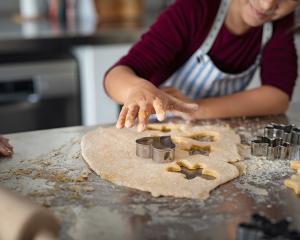
This week, parenting columnist Ian Munro looks at helping youngsters and when to let them take the lead.
How much help does a youngster need and how do you tell when to step back and let them get on with it?
No-one wants to create a dependent child but at the same time no-one wants to deprive their children of the support they need as they grow.
It's a fine line of trial and error and sometimes worth taking some guidance from those who know the child quite well but are a little more removed, such as grandparents or older siblings.
What we want to see in our youngster is a willingness to try things and master them. From this mastery will flow a sense of capability; a natural self-confidence.
Sometimes it can be frustrating to let them do things for themselves, especially if you're pushed for time or know there'll be a mess.
But if they want to dress or to feed themselves, let them try. It's better that they get to choose to do things with parental support and encouragement than get into a habit of choosing to do everything in defiance.
If outrightly defiant patterns of behaviour get established, they can cause big problems in the teenage years.
Here's the catch - it does require devotion of lots of time so that you can be around at appropriate moments. You can't choose those moments - they just happen.
As children master things and as they receive praise and feel good about doing them, so they stretch themselves further.
With the growth of supported independence tends to come acceptance of responsibility.
And it's OK if things don't work out first time around. There needs to be an attitude of "if at first you don't succeed, try again''. Failure is not the end of the world.
Children who are allowed to try and to make mistakes and learn from them, usually accept responsibility for their mistakes later in life and are not afraid to admit and apologise.
Having got it wrong, they are usually willing to try again instead of crawling back inside themselves and not trying any further.
And here's the fine line: parental failure to assist when actually needed can mean real frustration on the part of a child and a tendency to give up or throw tantrums.
Sometimes, too, you'll find a child has mastered something and, for some reason, suddenly can't, or rather won't, do it.
Recognise that perhaps a little personal attention is called for and this is one way for the child to get it. Either spend some time helping or offer some reward that involves your time and attention for successful completion of the task.
And then sometimes they might just be too tired to want to bother. You'll understand that feeling, too!












